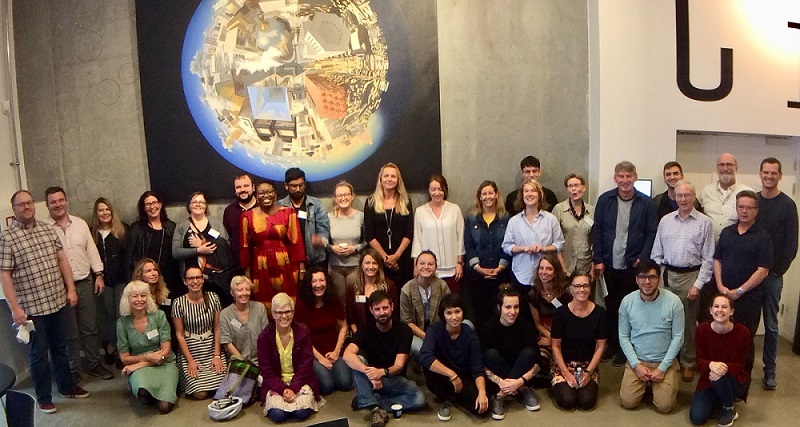The 17th Annual Ethnography Symposium
THEME: Crises, Change, and Continuities
Hosted by Cardiff Business School
Cardiff University
Wednesday 28 - Friday 30 August 2024

Conference Organising Committee:
Dr Anna Galazka, Cardiff Business School
Dr Katherine Parsons, Cardiff Business School
Dr Tracey Rosell, Cardiff Business School
Conference Co-Chairs:
Dr Abigail Schoneboom, Newcastle University
Dr Harry Wels, VU Amsterdam
Dr Mike Rowe, University of Liverpool
Dr Robin Smith Cardiff University School of Social Sciences
Dr Tom Vine, University of Suffolk
Confirmed Keynote Speakers:
Professor Rick Delbridge, Cardiff Business School
Dr Jenna Pandeli, University of the West of England
Dr Robin Smith, Cardiff University School of Social Sciences
Call for Papers
Ethnography has been traditionally thought of as a longitudinal and individual immersion in distant cultures. However, it has “taken on new stripes in the past few decades” (Tevington et al., 2023). Today, many ethnographers undertake transdisciplinary and creative research that produces original narrative and applied outputs.
The ethnographic research process has seen many innovations. To name just a few: there has been a proliferation of ‘quick and dirty’ rapid ethnographies (Vindrola-Padros & Vindrola-Padros, 2018) focused on short-term and intensive data collection in crisis-stricken healthcare; COVID-19 restrictions on in person research have led to a surge in evolving digital ethnographies (Forberg & Schilt, 2023); anthropocentric ethnographies have made room for multispecies analyses that give voice to non-human agents (Cornips & van den Hengel, 2021); other scholars have focused on the development of retrospective, collaborative autoethnographies (Tripathi et al., 2022) and carnal accounts (Wacquant, 2015) where researchers voice personal experiences and use their bodies for better sociological understanding.
But ethnography is not just a methodological research process. It also concerns the choices we make to write or otherwise present our findings (Forberg & Schilt, 2023). Books allow ethnographers to recreate the worlds examined in ways less constrained by word limits in journals (e.g. Delbridge, 1998), but even the latter increasingly create spaces for longer narrative accounts and non-conventional presentations that draw on creative methods to introduce new ways of thinking about the studied phenomena.
How has ethnography innovated itself over the years? What does the future of ethnography look like (Parsons et al., 2022)? What opportunities have these innovations created, and what challenges have they posed? How can ethnography continue innovating without forgetting its roots? The 17th Annual Ethnography Symposium is taking stock of the variety of ethnographic innovations while learning from the wisdom of ethnographic classics. We welcome papers from any disciplinary background on any theme, provided they invoke a method of ethnography and encourage the conversation about tradition and innovations.
Submission Details
Abstracts (up to 500 words) should be submitted to EthnographySymposium2024@cardiff.ac.uk, as a Microsoft Word format (doc. or docx.), saved as the author’s surname followed by the paper title, by Thursday 21st March, 2024. Abstracts should list all authors, an e-mail contact and institutional affiliation details at the top of the first page. Decisions on acceptance of papers, subject to external refereeing, will be provided by e-mail no later than the 26th April 2024.
Further details and how to register will follow shortly. In the meantime, if you have any questions, please email EthnographySymposium2024@cardiff.ac.uk
References:
Cornips, L., & van den Hengel, L. (2021). Place-making by cows in an intensive dairy farm: A sociolinguistic approach to nonhuman animal agency. In B. Bovenkerk & J. Keulartz (Eds.): Animals in our midst: The challenges of co-existing with animals in the anthropocene (pp. 177–201). Springer International Publishing. https://doi.org/10.1007/978-3-030-63523-7_1
Delbridge, R. 1998. Life on the line in contemporary manufacturing: The workplace experience of Lean production and the `Japanese' model. Oxford: Oxford University Press.
Forberg, P., & Schilt, K. (2023). What is ethnographic about digital ethnography? A sociological perspective. Frontiers in Sociology, 8. https://www.frontiersin.org/articles/10.3389/fsoc.2023.1156776
Parsons, K., Courpasson, D. and Delbridge, R. (2022). Futures of organizational ethnography: (Post) pandemic reflections and new possibilities. In: Pandeli, J., Sutherland, N. and Gaggiotti, H. (eds). Organizational ethnography (pp. 213-226). Oxon: Routledge. doi-org.abc.cardiff.ac.uk/10.4324/9781003021582
Tevington, P., Davis, W. J., Urban, J. B., & Linver, M. R. (2023). “Been there, done that but also not quite:” Discoveries and limitations in an evaluative, short-term, and multi-sited ethnography of the boy scouts of America. Ethnography, 14661381231181625. https://doi.org/10.1177/14661381231181625
Tripathi, A., Polus, R., Zhang, Y., Nautiyal, R., & Shaheer, I. (2022). ‘Remember that time?’: Introducing retrospective collaborative autoethnography. Tourism Recreation Research, 0(0), 1–6. https://doi.org/10.1080/02508281.2022.2109864
Vindrola-Padros, C., & Vindrola-Padros, B. (2018). Quick and dirty? A systematic review of the use of rapid ethnographies in healthcare organisation and delivery. BMJ Qual Saf, 24(4), 321–330. https://doi.org/10.1136/bmjqs-2017-007226
Wacquant, L. (2015). For a sociology of flesh and blood. Qualitative Sociology, 38(1), 1–11. https://doi.org/10.1007/s11133-014-9291-y